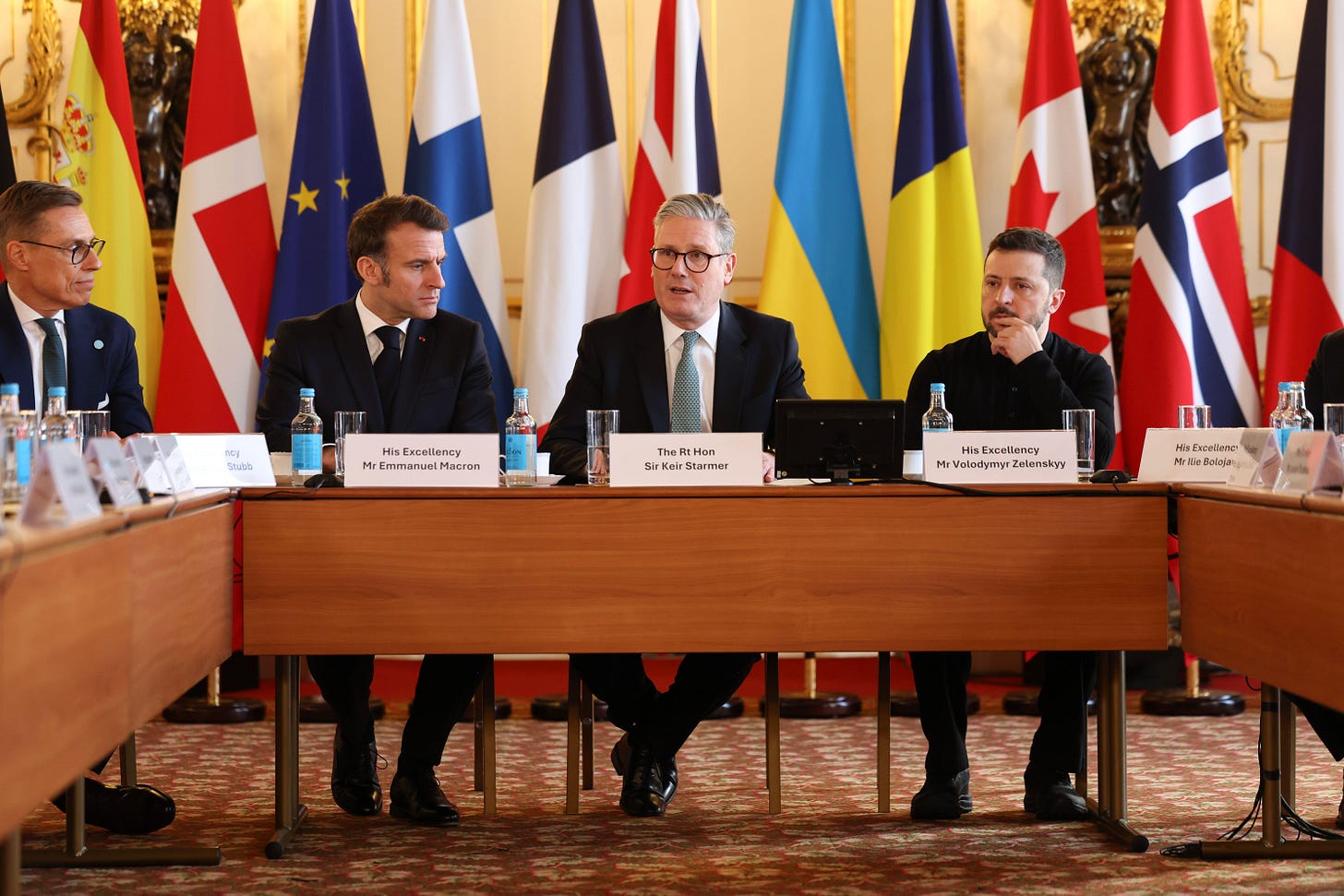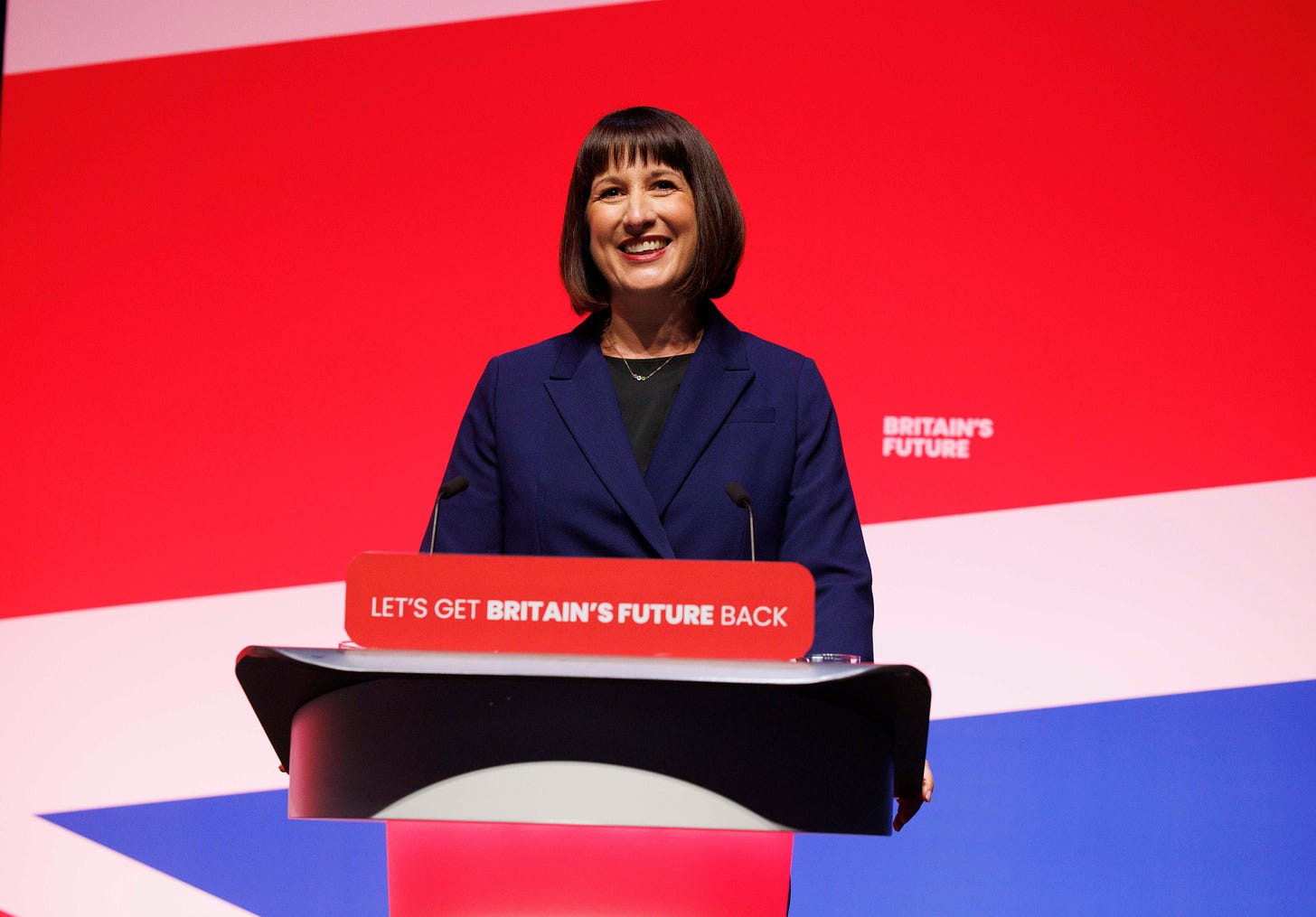Is Europe ready for a NATO without America?
Today’s Paris summit was a clear attempt to bring European strategic interests back into the picture on Ukraine.

Europe’s “coalition of the willing” assembled in Paris earlier today. Its aim? To confront the reality of a transatlantic alliance without Washington’s steadfast support. As President Trump persists in negotiating with Russia over the heads of NATO allies, European powers are attempting to reassert themselves on the international stage.
The leaders of 31 NATO countries met at the Elysée Palace to decide how the alliance can continue supporting Ukraine in the age of Trump 2.0. The summit, hosted by French president Emmanuel Macron, included representatives of all NATO members except for the United States, which was absent from the discussions. Mark Rutte, NATO secretary-general, and Ursula von der Leyen, the President of the European Commission, were also present.
Today’s summit was a clear attempt to bring European strategic interests back into the picture on the Russia-Ukraine negotiations. The summit follows an agreement struck between Russia and the US in Saudi Arabia on Tuesday, which floated the possibility of some sanctions relief for Moscow in return for a maritime ceasefire in the Black Sea.
Notably, European leaders rejected Russian president Vladimir Putin’s request for sanctions relief out of hand, with the Finnish President, Alexander Stubb, saying that the assembled leaders are already working on a new package to broaden sanctions and starve Russia’s war economy.
Britain and France once again signalled their willingness to ramp up support for Kyiv, even as the United States builds a rapprochement with Russia. In statements made following the meeting, Sir Keir Starmer and president Macron were clear: Europe must do more to assert its own interests and guarantee Ukraine’s security.
Speaking at a press conference, the British Prime Minister called for western sanctions on Russia to be increased in order to bring Putin to the negotiating table.
He said: “we must go further now to support the peace process, support Ukraine and increase pressure on Russia to get serious… It means increasing the economic pressure on Russia, accelerating new tougher sanctions, bearing down on Russia’s energy revenues, and working together to make this pressure count”.
Starmer also accused president Putin of “playing games and playing for time” by demanding a suite of ambitious sanctions relief measures that will delay the implementation of a ceasefire in the Black Sea. He proposed that the Kremlin should be given a clear deadline to stop waging war in Ukraine.
Starmer’s stern words were echoed by Macron. The French president accused Russia of “pretending” to be interested in peace, and confirmed that “it is not the time to lift sanctions”. Standing alongside President Volodymyr Zelensky, he reproached Russia for attempting to “dictate the conditions of durable peace”, stating that “Russia can’t have a say in the support we give and will give to Ukraine”.
Instead, Macron floated the idea of using frozen Russian assets, currently deposited in western countries, to boost western support Kyiv. In a dramatic statement of the sort that we have come to expect from the French president, he declared that Europe will send troops to Ukraine with or without the US. He also suggested, alongside Zelensky, that a “reassurance force” could be deployed in “strategic areas” around Ukraine.
So far, Starmer and Macron’s Entente Cordiale has held strong, and an Anglo-French gauntlet has been thrown down to Moscow and Washington.
British and French enthusiasm is not unanimously shared in Europe, however. The meeting provided an indication of European powers’ resolve and determination to continue supporting Ukraine, but also exposed fractures in the transatlantic alliance. Indeed, there is a divide among European capitals, one that could easily deepen as the Trump administration presses ahead with a diplomatic strategy that diverges considerably from the interests of its traditional allies.
There is a growing coalition of powers, including Hungary and Italy, that have expressed their unease about the US’s absence from talks on Ukraine. They have also poured cold water on plans emanating from Paris and London to station a pan-European peacekeeping force designed to safeguard Ukrainian sovereignty from further Russian attack.
Last week, the Italian Prime Minister, Giorgia Meloni, branded such plans as “risky, complex and ineffective.” Today, she expressed her hope that US representatives would be included in any further NATO meetings on the Russo-Ukrainian conflict; she also reiterated her country’s refusal to send troops as part of any force assembled to defend a future peace deal in Ukraine.
Meloni’s scepticism has found a ready audience in other European capitals, many of which are heavily indebted and fear that the continent cannot realistically take an independent line on Ukraine without American material and military support.
Nor is it entirely clear whether consistent British and French cooperation can be guaranteed. Efforts to exercise Anglo-French leadership of any coalition of the willing could yet be undermined by President Macron’s determination to keep British defence companies out of a common European Union fund to enhance the continent’s security.
There is also a contrast between Macron’s increasingly robust approach to the White House and Starmer’s desire to tread carefully for fear of alienating President Trump. This afternoon, Starmer repeated his call for a “US backstop” for any potential European peacekeeping forces sent to Ukraine.
And the British defence secretary, John Healey, has moved very quickly to quash rumours, reported today in The Times, that the next Supreme Allied Commander Europe (SACEUR) – a position that has always been held by an American four-star general – could be a British military figure.
ON REACTION TODAY
Gerald Warner
The Reeves delusion: more tinkering won’t save Britain from decline
ALSO KNOW
UK chancellor Rachel Reeves faces pressure amid economic challenges – Chancellor Rachel Reeves is under increasing pressure following the Spring Statement, which introduced spending cuts and welfare reforms aimed at stabilising the UK's debt-laden economy. The Office for Budget Responsibility has warned that these measures, coupled with potential global trade tensions, could necessitate further tax increases in the autumn budget.
President Trump's car tariffs threaten UK automotive industry – U.S. President Donald Trump has announced a 25% tariff on foreign-made cars, posing a significant threat to the UK automotive sector, which exports £6.4 billion worth of vehicles to the U.S. annually. High-end brands like Jaguar Land Rover and Bentley are particularly vulnerable. The UK government is negotiating for exemptions but faces criticism for not implementing retaliatory measures.
Nissan unveils new electric vehicles to revive UK plant – Amid financial struggles, Nissan has revealed plans to produce three new electric vehicle models—the all-new Leaf EV, a revived Micra, and updated versions of the Qashqai and Juke—at its Sunderland plant in the UK. This initiative aims to secure the plant's future and align with the UK's Zero Emission Vehicle mandate, despite the company's global challenges, including significant losses and layoffs.
FIVE THINGS
Can the Five Eyes survive the Signal scandal? James Ball in Prospect.
Russia has most to gain from Black Sea ceasefire – but it’s marginal, and Ukraine benefits too. Basil Germond in The Conversation.
Britain has to break its addiction to debt. Christopher Snowdon in The Critic.
Has the Assisted Dying Bill been killed off? Charles Moore in The Spectator.
The Perils of “Russia First.” Alexander Vindman in Foreign Affairs.



